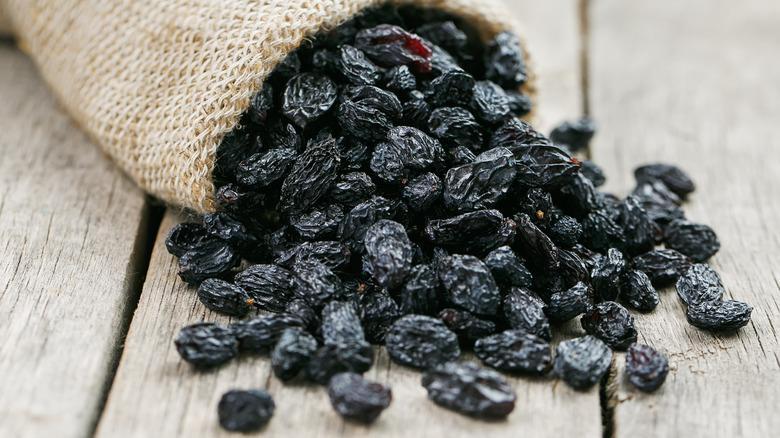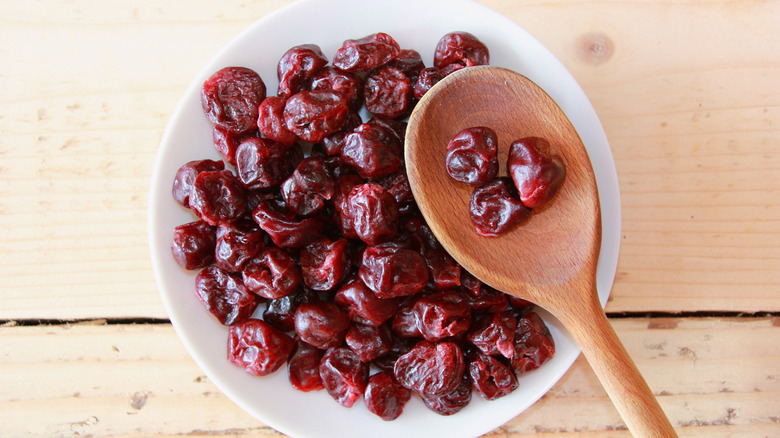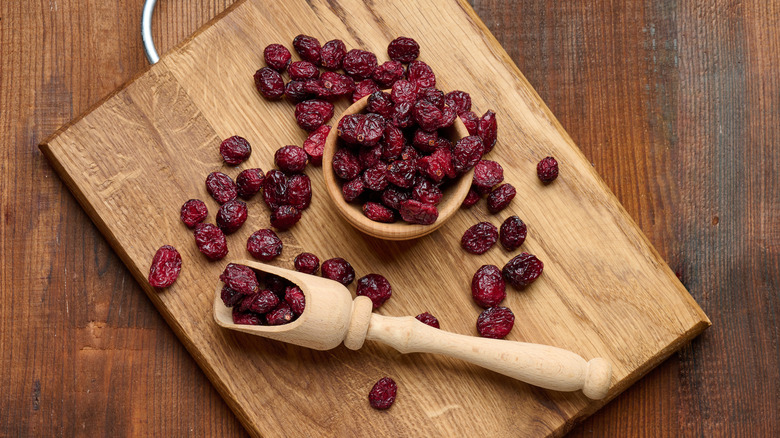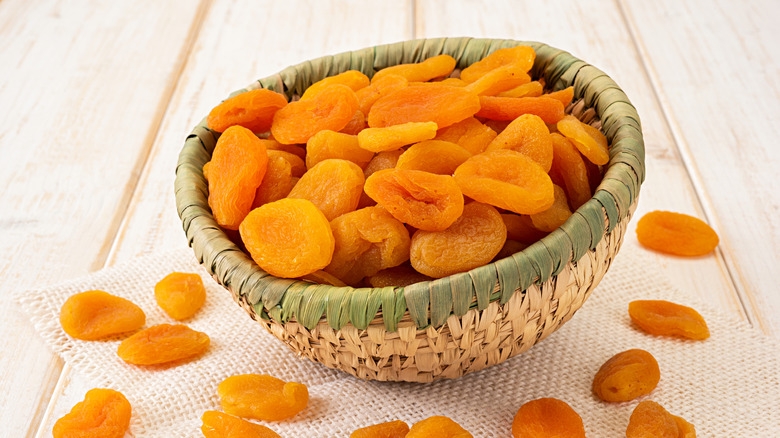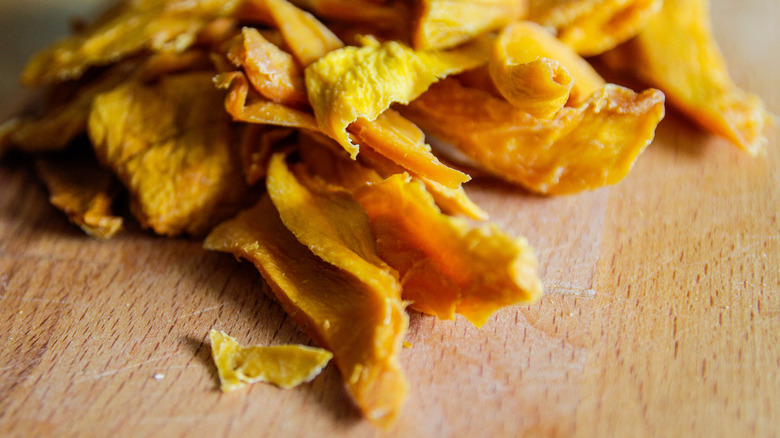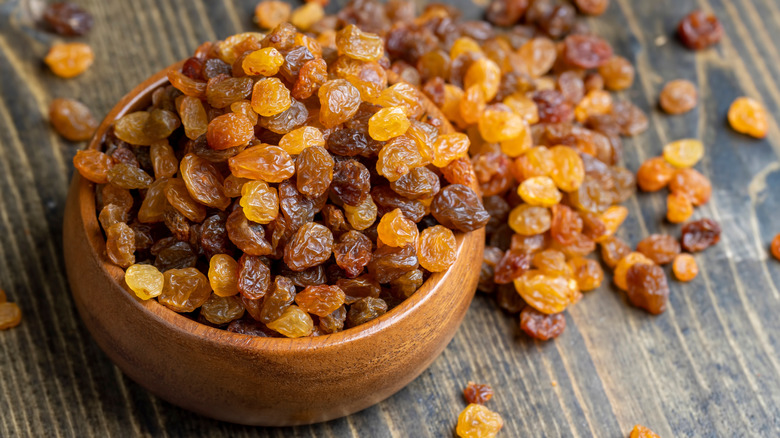5 Delicious Swaps For Raisins In Baked Goods
Raisins are the marmite of the dried fruit world — you either love them or you hate 'em. It's remarkable that the simple process of slowly drying grapes can produce such concentrated little bursts of deep sweetness and fruitiness. Big flavors do, it turns out, come in small packages. There's also denying that these powerful little pebbles of fruity flavor are ubiquitous in baking. But raisins aren't the only dried fruits out there — you can find almost any fruit in a dried variation, in fact. So it begs the question: What if you're setting out to make some oatmeal cookies when — shock horror — you don't have any raisins? or what if you just ... don't like them very much?
To find out more, Food Republic asked Sofia Schlieben, corporate pastry chef at JF Restaurants. So, are there any unique or underappreciated dried fruits that deserve their moment in the sun? And can they help the raisin-phobes among us by acting as an easy substitute?
"Personally, I like almost all dried fruits more than raisins, with cherries and apricots being my favorites," she told us. There is something to keep in mind before swapping out raisins for other dried fruits, though: "Raisins are usually more tender than most other dried fruits." To recreate that ideal texture, "soak your dried fruit briefly in a lightly sweetened syrup (a ratio of 1:4 sugar to water) before using them. This step softens the fruit and enhances its flavor, making it an even better substitute."
Dried cherries are a good go-to
While dried cherries aren't anywhere near as common as raisins, and they won't show up in recipes as often as their fresh counterparts, they can still impart some of the same tangy sugar kick. "'They offer a brighter, tangier profile," than raisins do, Chef Sofia Schlieben said, but with a similar sweetness.
These ruby delights can really zhuzh up recipes that would otherwise lack the brightness that cherries and other stone fruits can bring. Your classic oatmeal and raisin cookie, for example, can really be brought to life with the addition of dried cherries. Simply swap them out for the raisins that you would use and watch a familiar favorite recipe transform into what Schlieben called "something more exciting with an oaty almond cherry cookie."
Cranberries can also make a great swap
Sing it from the rooftops: Cranberries are good for more than just sauce! Sure, their juice when fresh makes for a delightful pairing with vodka (and an even better one when you infuse the whole fruit for a delectable cranberry liqueur), but dried cranberries can be a great way to inject some excitement into your baking, which Chef Sofia Schlieben said, "can elevate classic recipes."
With a similar bright, tart flavor profile to dried cherries, they offer a complexity and depth that raisins just can't match. They're not just a swap: They're an upgrade. You might be wondering about preparation, but luckily because cranberries are pretty close to raisins in terms of size, you won't need to do anything to them at all before you bake! "For smaller fruits like cherries or cranberries, I typically leave them whole," Chef Schlieben told Food Republic.
Try apricots for even more complexity
Dried apricots are a staple, but you might not have thought to use them in baking before. You really should be, though, as with their blend of sweetness, bitterness, and tartness, they offer a surprisingly nuanced flavor profile that'll give any dish a boost.
While raisins bring a wonderful warmth and deep brown sugar sweetness to baked goods, apricots can yield a slightly more complex-tasting bake. They've got the distinct sweetness of stone fruits, like all the best bits of a peach and a plum rolled into one, and pair really well with herbal, vegetal flavors.
Chef Schlieben suggested we incorporate those notes alongside dried apricots when baking, returning to the classic oatmeal raisin cookie as a potential platform to experiment — so why not swap those raisins out for an "oat, thyme, and apricot variation." Using apricots instead of raisins here can also lead to a serious textural upgrade, according to Chef Schlieben: "These swaps add unique flavors and textures that feel fresh and modern."
Go for a more rounded flavor with mangoes and pears
Dried mango is one of the more commonly eaten dried fruits, a longtime packed lunch hero. But it is also a versatile ingredient, and it's right at home replacing raisins in your baked goods. It has a deep, tropical, sweet flavor, with a slightly tangy aftertaste reminiscent of ripe plums.
Dried pears, on the other hand, bring the sweetness but with a little less of the lingering tart flavor. They make for a delicious companion in slightly darker, nuttier, more autumnal-tasting bakes, such as a pecan and pear upside down cake, or even in (you guessed it) a riff on the classic yet irresistible oatmeal cookie. When using "larger fruits like apricots, mangoes, or pears," though, bear in mind that to sub them in for raisins, you may need to do a little prep work. "I'll cut them into smaller pieces to ensure they distribute evenly throughout the dish," Chef Schlieben told us.
You could also use golden raisins for some extra sweetness
It seems odd to suggest that an excellent substitute for raisins when it comes to baking is, err, raisins — but it's true! Well, sort of, anyway. Golden raisins, the cousin of traditional raisins, are made from the same grapes but are dried using a different method and treated to retain their original lighter, golden color.
They "are typically sweeter and pair beautifully with spiced rum," Chef Schlieben told us. "The gentle caramel notes of the raisins complement the warmth of the rum, making them an excellent choice for baked goods like bread pudding, spice cakes, or even holiday fruit loaves. They bring a subtle richness and depth that traditional raisins don't quite match." They make for a particularly easy swap for the raisins we're more accustomed to seeing, so they're definitely worth exploring the next time you're baking with dried fruit. They tend to be slightly smaller, so you may get a better dispersal throughout your baked goods than traditional darker raisins.

